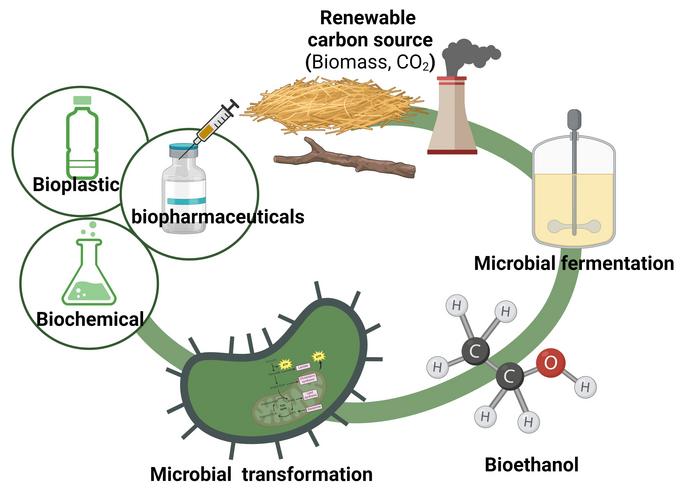Harnessing Ethanol for Sustainable Biomanufacturing
A comprehensive review explores ethanol as a renewable carbon source for producing high-value products, offering new solutions for sustainable industrial biotechnology
Oct 14, 2024
[DALL-E]
A new review in Biotechnology for Biofuels and Bioproducts sheds light on the untapped potential of ethanol as a renewable carbon source for producing high-value products. Led by Associate Prof. Peng Wang from the Hefei Institutes of Physical Science at the Chinese Academy of Sciences, in collaboration with Dr. Rodrigo Ledesma-Amaro from Imperial College London, the research offers fresh perspectives for eco-friendly industrial biotechnology processes.
Traditionally, industrial biotechnology has relied on microbes to convert carbohydrate-rich substrates, like sugar or starch, into valuable products. But as global population growth puts increasing pressure on food resources, the competition between food and fuel is intensifying. The pressing need to find sustainable alternatives that don’t threaten food supplies has never been more urgent.

This review takes a deep dive into ethanol as a promising renewable substrate, highlighting its unique benefits. It provides a thorough examination of microbial ethanol metabolism pathways and mechanisms of ethanol tolerance—key areas that form the backbone of engineering industrial strains for improved performance. Furthermore, the research reviews recent advancements in ethanol biosynthesis and ethanol-driven biomanufacturing, showcasing its potential to produce high-value chemicals such as bioplastics, pharmaceutical precursors, and organic acids.
Looking forward, the study doesn't shy away from addressing potential challenges and future research opportunities in ethanol-based biomanufacturing. It positions ethanol as a viable solution to the resource challenges facing biomanufacturing today, promoting greener, more sustainable industrial processes.


















